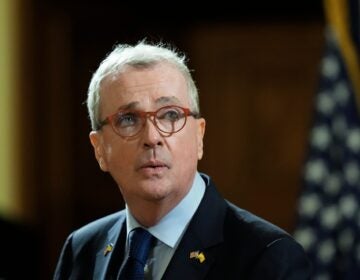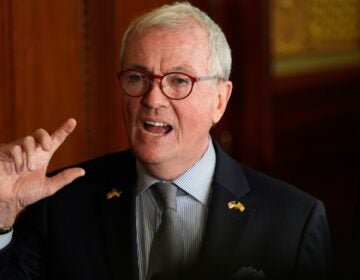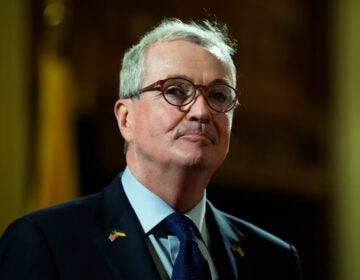Third time’s the charm? Murphy floats N.J. tax hike on millionaires again
New Jersey Gov. Phil Murphy is proposing a state budget to lawmakers that includes a tax hike on earners making over $1 million a year.
For the third straight year, New Jersey Gov. Phil Murphy is proposing a state budget to lawmakers that includes a tax hike on earners making over $1 million a year.
“The millionaire’s tax is a matter of fairness to our middle class homeowners and renters, our seniors, and the countless families reaching to pull themselves up and into the middle class,” the former Goldman Sachs executive said during his budget address Tuesday.
And again, Murphy is expected to face opposition to the idea from Democratic leaders in the state legislature, who have resisted the first-term governor’s attempts to raise taxes on high-income earners.
“I’m always encouraged by a spirit of cooperation between the Governor’s office and the Legislature,” Assembly Speaker Craig Coughlin, D-Middlesex, said in a statement before the speech Monday. “However, I remain cautious of increasing any broad-based taxes on an already overburdened state.”
Senate President Steve Sweeney, D-Gloucester, who has also opposed the move in recent years, told NJ Advance Media over the weekend that he would be open to a tax hike on millionaires only if Murphy contributed an extra $1 billion to the underfunded public pension system.
Administration officials estimated that the state could raise $494 million from increasing the marginal tax rate on every dollar earned over $1 million from 8.97% to 10.75%.
According to a Rutgers-Eagleton Institute of Politics and Fairleigh Dickinson poll released last year, 72% of respondents supported a tax hike on millionaires while just 14% opposed it.
The Democrat-controlled legislature repeatedly passed a millionaire’s tax under former Republican Gov. Chris Christie, but switched their position under Murphy, claiming that residents are more cash-strapped now thanks to federal tax changes.
Still, the possibility of a millionaire’s tax is just a piece of what’s included in Murphy’s proposed $40 billion budget.
Murphy again proposed an increase on gun permit fees as well as what he calls a “corporate responsibility fee,” which the state would levy on employers of a certain size that do not offer their employees health insurance. The governor also floated increasing the state’s cigarette tax, which is currently $2.70 per pack, to $4.35.
Although Sweeney said he would be open to backing the millionaire’s tax, he appeared to draw a line when it came to raising other taxes and fees.
“I don’t support revenue raisers,” Sweeney told reporters after Murphy’s speech. “I said I’m open to the millionaire’s tax with a caveat, an additional one billion dollars.”
The budget would include a record $4.6 billion pension payment, a $745 million contribution to the state’s rainy-day fund, as well as other investments in education, job training, and New Jersey Transit. The increase in public transit funding would come without a fare hike, Murphy said.
The proposal also projects $566 million in savings from public employee health benefits and aims to use one-shot revenue sources for just 0.8% of the overall budget, the first time that number has dipped below 1% in more than a decade, officials said.
Brandon McKoy, president of the progressive think tank New Jersey Policy Perspective, praised Murphy’s budget proposal and the governor’s intention of giving more money to programs that had seen flat funding for years. “For the state to create an economy that works for the many, New Jersey needs big and bold tax reform to fully fund programs and services that were slashed over the past decade,” McKoy said.
Others praised the governor’s plan to hike the state’s cigarette tax. “The $1.65 increase would be substantial and would certainly help a number of people quit. We think it’s a really progressive idea,” said Samantha DeAlmeida, with the American Cancer Society Cancer Action Network.
Still, some felt that Murphy’s proposals — the corporate responsibility fee, in particular — continued to ask more of residents and business owners without addressing what they saw as the state’s affordability problem.
“While the governor spoke of where he’s saving money in certain areas, at the end of the day the message is: increase spending, which means increase taxes,” said Michele Siekerka, president and CEO of the New Jersey Business and Industry Association.
WHYY is your source for fact-based, in-depth journalism and information. As a nonprofit organization, we rely on financial support from readers like you. Please give today.




